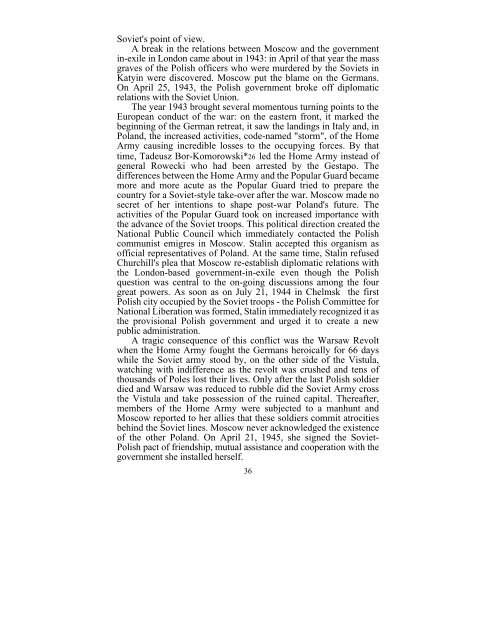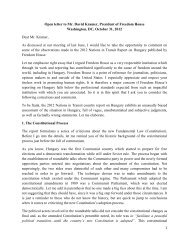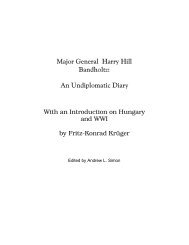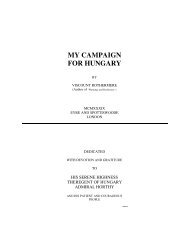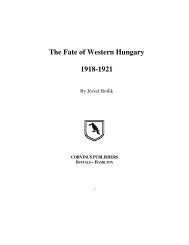the text - Corvinus Library - Hungarian History
the text - Corvinus Library - Hungarian History
the text - Corvinus Library - Hungarian History
You also want an ePaper? Increase the reach of your titles
YUMPU automatically turns print PDFs into web optimized ePapers that Google loves.
Soviet's point of view.<br />
A break in <strong>the</strong> relations between Moscow and <strong>the</strong> government<br />
in-exile in London came about in 1943: in April of that year <strong>the</strong> mass<br />
graves of <strong>the</strong> Polish officers who were murdered by <strong>the</strong> Soviets in<br />
Katyin were discovered. Moscow put <strong>the</strong> blame on <strong>the</strong> Germans.<br />
On April 25, 1943, <strong>the</strong> Polish government broke off diplomatic<br />
relations with <strong>the</strong> Soviet Union.<br />
The year 1943 brought several momentous turning points to <strong>the</strong><br />
European conduct of <strong>the</strong> war: on <strong>the</strong> eastern front, it marked <strong>the</strong><br />
beginning of <strong>the</strong> German retreat, it saw <strong>the</strong> landings in Italy and, in<br />
Poland, <strong>the</strong> increased activities, code-named "storm", of <strong>the</strong> Home<br />
Army causing incredible losses to <strong>the</strong> occupying forces. By that<br />
time, Tadeusz Bor-Komorowski*26 led <strong>the</strong> Home Army instead of<br />
general Rowecki who had been arrested by <strong>the</strong> Gestapo. The<br />
differences between <strong>the</strong> Home Army and <strong>the</strong> Popular Guard became<br />
more and more acute as <strong>the</strong> Popular Guard tried to prepare <strong>the</strong><br />
country for a Soviet-style take-over after <strong>the</strong> war. Moscow made no<br />
secret of her intentions to shape post-war Poland's future. The<br />
activities of <strong>the</strong> Popular Guard took on increased importance with<br />
<strong>the</strong> advance of <strong>the</strong> Soviet troops. This political direction created <strong>the</strong><br />
National Public Council which immediately contacted <strong>the</strong> Polish<br />
communist emigres in Moscow. Stalin accepted this organism as<br />
official representatives of Poland. At <strong>the</strong> same time, Stalin refused<br />
Churchill's plea that Moscow re-establish diplomatic relations with<br />
<strong>the</strong> London-based government-in-exile even though <strong>the</strong> Polish<br />
question was central to <strong>the</strong> on-going discussions among <strong>the</strong> four<br />
great powers. As soon as on July 21, 1944 in Chelmsk <strong>the</strong> first<br />
Polish city occupied by <strong>the</strong> Soviet troops - <strong>the</strong> Polish Committee for<br />
National Liberation was formed, Stalin immediately recognized it as<br />
<strong>the</strong> provisional Polish government and urged it to create a new<br />
public administration.<br />
A tragic consequence of this conflict was <strong>the</strong> Warsaw Revolt<br />
when <strong>the</strong> Home Army fought <strong>the</strong> Germans heroically for 66 days<br />
while <strong>the</strong> Soviet army stood by, on <strong>the</strong> o<strong>the</strong>r side of <strong>the</strong> Vistula,<br />
watching with indifference as <strong>the</strong> revolt was crushed and tens of<br />
thousands of Poles lost <strong>the</strong>ir lives. Only after <strong>the</strong> last Polish soldier<br />
died and Warsaw was reduced to rubble did <strong>the</strong> Soviet Army cross<br />
<strong>the</strong> Vistula and take possession of <strong>the</strong> ruined capital. Thereafter,<br />
members of <strong>the</strong> Home Army were subjected to a manhunt and<br />
Moscow reported to her allies that <strong>the</strong>se soldiers commit atrocities<br />
behind <strong>the</strong> Soviet lines. Moscow never acknowledged <strong>the</strong> existence<br />
of <strong>the</strong> o<strong>the</strong>r Poland. On April 21, 1945, she signed <strong>the</strong> Soviet-<br />
Polish pact of friendship, mutual assistance and cooperation with <strong>the</strong><br />
government she installed herself.<br />
36


